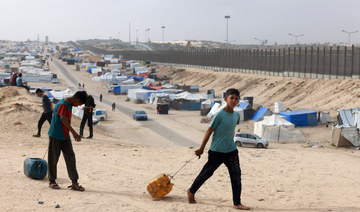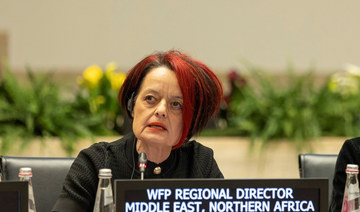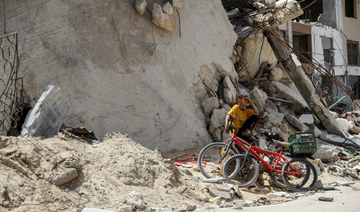JOS, Nigeria: More than 200 people were killed in violence against farming communities last weekend in Plateau state, central Nigeria, according to a speech by the governor published on Wednesday.
Simon Lalong said after a closed-door meeting with President Muhammadu Buhari in the state capital Jos on Tuesday night that the clashes had left “the painful loss of over 200 people.”
The police, who blame suspected cattle herders, have said 86 people were killed. However, multiple local sources from the communities affected maintained more than 100 people died.
The main association representing the largely nomadic herders has denied its community had any involvement in the killings.
The violence is the latest bout in months of bloodletting in Nigeria’s so-called “Middle Belt.”
The clashes are rooted in tensions over access to land between pastoral herders and sedentary farmers, but have generated sectarian friction between Muslims and Christians.
Lalong suggested “criminal elements” were exacerbating tensions, including “conflict merchants” involved in “cattle rustling, theft, banditry, gun running” and other crimes.
Buhari came to power in 2015 on a promise to curb insecurity across the country, in particular Boko Haram, whose Islamist insurgency has killed at least 20,000 since 2009.
But a resurgence of violence in the long-running conflict between herders and farmers has put that under scrutiny as elections approach in February next year.
Analysts predict the extent of the unrest could eclipse that of the jihadists in the northeast.
Lalong said the latest attacks in Plateau were carried out with “sophisticated weapons” that were “reflective of a terrorist invasion.”
“It (the bloodshed) therefore demands a justified response like that which was undertaken to address the Boko Haram insurgency,” he added.
Lawmakers earlier this month threatened Buhari with impeachment because his security chiefs had repeatedly failed to protect lives and property.
The 75-year-old leader on Tuesday said he would “continue to pressurize members of the law enforcement agencies directly under me by the constitution as the commander-in-chief.”
He also said it was an “injustice” to imply he was doing nothing because he was from the same ethnic Fulani group as the herders and Muslim.
Over 200 killed in weekend violence in central Nigeria: governor
Over 200 killed in weekend violence in central Nigeria: governor
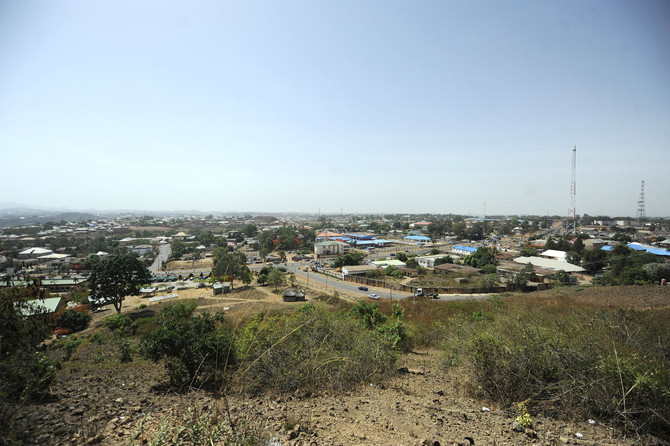
Morocco, Algeria dispute over shirts leads to second cancelation
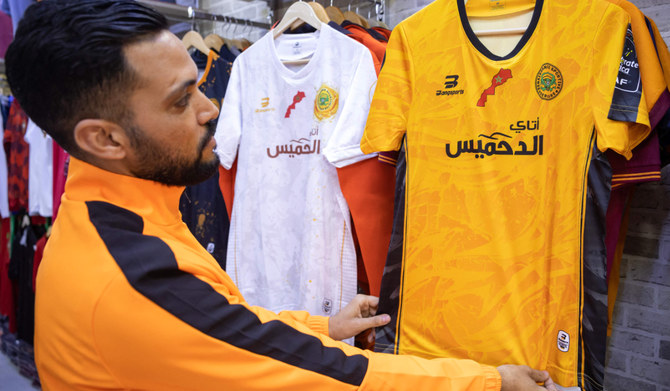
- Before kick-off on Sunday, Renaissance supporters held up a banner with a map of Morocco showing the disputed territory. Many fans waved Moroccan flags
- The former Spanish colony of Western Sahara is largely controlled by Morocco but claimed by the Algeria-backed Polisario Front, which seeks the territory’s independence
BERKANE, Morocco: For the second straight week, an African Confederation Cup match between Renaissance Berkane and Algerian side USM Alger was canceled in a dispute over a map on the Moroccan team’s shirts.
The Confederation of African Football (CAF) awarded Berkane a 3-0 victory in the first leg of their semifinal, canceled last Sunday when the Moroccan club refused to take the field after Algerian officials confiscated their shirts.
On Sunday in Berkane, only the home players took the field and they saluted their fans as the stadium announcer told the crowd the match had been canceled.
Moroccan television reported that the USM team left the stadium just before the scheduled 1900 GMT kickoff.
The row began when the Moroccan squad arrived in Algeria last week ahead of the first-leg tie.
Customs officers confiscated Berkane’s shirts on the grounds that they carried a map of Morocco that included the disputed Western Sahara.
Shortly before the first leg kick-off, USM Alger sporting director Toufik Korichi told Algerian radio that the match would not be played because Berkane refused to take to the pitch in any other shirts
The former Spanish colony of Western Sahara is largely controlled by Morocco but claimed by the Algeria-backed Polisario Front, which seeks the territory’s independence.
Algeria broke off diplomatic relations with Morocco in 2021, partly over the issue.
Before kick-off on Sunday, Renaissance supporters held up a banner with a map of Morocco showing the disputed territory. Many fans waved Moroccan flags.
On Saturday, business was brisk in the official shop selling Berkane shirts.
“There’s a huge demand,” said Soufiane Al Korchi, a representative of the official distributor of the Moroccan team shirt, adding that the “map has been part of the official design for three years.”
The Algerian football federation has lodged an appeal against the CAF sanction with the Court of Arbitration for Sport in Lausanne, arguing that the Cairo-based body had “validated the request of the Moroccan club, RS Berkane, to wear a shirt with a political message.”
Palestinian prisoner in Israel wins top fiction prize
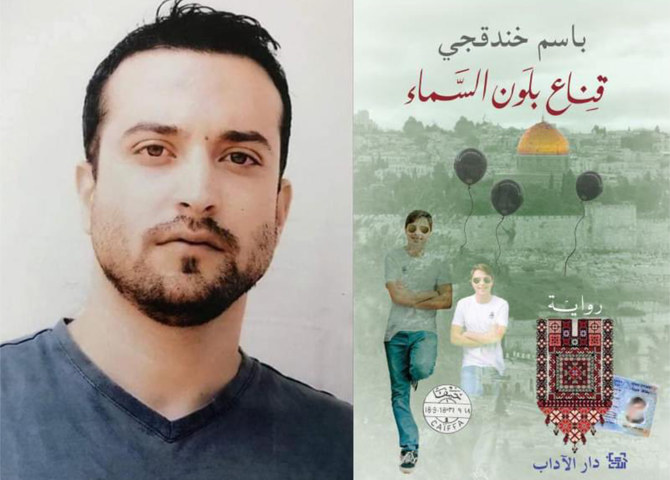
- The mask in the novel’s title refers to the blue identity card that Nur, an archaeologist living in a refugee camp in Ramallah, finds in the pocket of an old coat belonging to an Israeli
ABU DHABI: Palestinian writer Basim Khandaqji, jailed 20 years ago in Israel, won a prestigious prize for Arabic fiction on Sunday for his novel “A Mask, the Color of the Sky.”
The award of the 2024 International Prize for Arabic Fiction was announced at a ceremony in Abu Dhabi.
The prize was accepted on Khandaqji’s behalf by Rana Idriss, owner of Dar Al-Adab, the book’s Lebanon-based publisher.
Khandaqji was born in the Israeli-occupied West Bank city of Nablus in 1983, and wrote short stories until his arrest in 2004 at the age of 21.
He was convicted and jailed on charges relating to a deadly bombing in Tel Aviv, and completed his university education from inside jail via the Internet.
The mask in the novel’s title refers to the blue identity card that Nur, an archaeologist living in a refugee camp in Ramallah, finds in the pocket of an old coat belonging to an Israeli.
Khandaqji’s book was chosen from 133 works submitted to the competition.
Nabil Suleiman, who chaired the jury, said the novel “dissects a complex, bitter reality of family fragmentation, displacement, genocide, and racism.”
Since being jailed Khandaqji has written poetry collections including “Rituals of the First Time” and “The Breath of a Nocturnal Poem.”
He has also written three earlier novels.
Pro-Palestinian protests keep roiling US college campuses
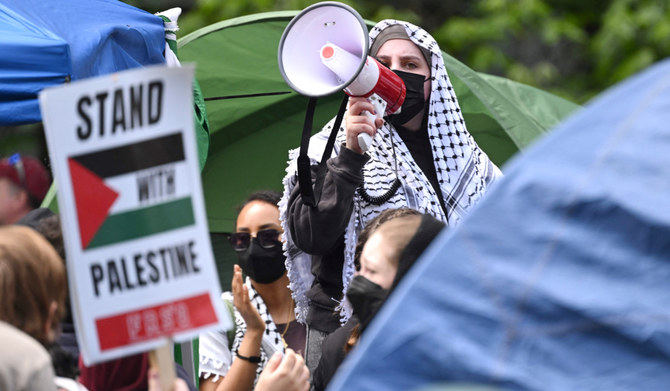
- Israel has killed more than 34,000 Palestinians, according to Gaza’s Health Ministry
- “They were expecting about 65,000 people on campus, and they just did not feel that it was going to be safe,” Bass said on CNN’s “State of the Union”
WASHINGTON: Pro-Palestinian protests at US universities showed no sign of slowing as they spread coast-to-coast over the weekend and police crackdowns and arrests continued into another week while students vowed to stay in tent encampments until their demands are met.
The students’ demands range from a ceasefire in Israel’s war with Hamas to calls for universities to stop investing in Israeli enterprises involved with the country’s military to an end for US military assistance for Israel.
Pro-Palestinian protests have spread to college campuses across the US, stoked by the mass arrest of over 100 people on Columbia University’s campus more than a week ago.
The Columbia campus was peaceful on Saturday and there were no reports of arrests of disturbances overnight, a school spokesman told Reuters.
But crackdowns continued at a handful of campuses on Saturday including a lockdown at the University of Southern California (USC) and a heavy police presence. More than 200 people were arrested at a handful of schools including 80 late on Saturday at Washington University in St. Louis. Among those arrested at Washington University was 2024 Green Party presidential candidate Jill Stein.
“They are sending in the riot police and basically creating a riot in an otherwise peaceful demonstration. So this is just shameful,” Stein said in a statement.
Washington University said in a statement that those arrested would be charged with trespassing.
On Sunday, dueling demonstrations were set to begin at the University of Southern California, Los Angeles. Outside groups were planning to demonstrate in favor of and against the pro-Palestinian encampments.
Members of the Harriet Tubman Center for Social Justice planned to support students’ right to protest.
In opposition, however, a group called Stand With Us will hold a “Stand in Support of Jewish Students” rally to “stand up against hatred and antisemitism.”
The nationwide protests have caught the attention of President Joe Biden.
White House national security spokesman John Kirby told ABC News on Sunday that the president knows there are very strong feelings about the war in Gaza.
“He understands that, he respects that and as he has said many times, we certainly respect the right of peaceful protest,” Kirby said. “People should have the ability to air their views and to share their perspectives publicly, but it has to be peaceful.”
Kirby added that the president condemns antisemitism and condemns hate speech.
At USC, leadership has canceled the main commencement ceremony after it called off the valedictorian speech by a Muslim student who said she was silenced by anti-Palestinian hatred.
Los Angeles Mayor Karen Bass said on Sunday she believed that canceling the commencement was a decision “they had to make.”
“They were expecting about 65,000 people on campus, and they just did not feel that it was going to be safe,” Bass said on CNN’s “State of the Union.”
Saudi Arabia committed to preserving environment, water resources, minister tells WEF
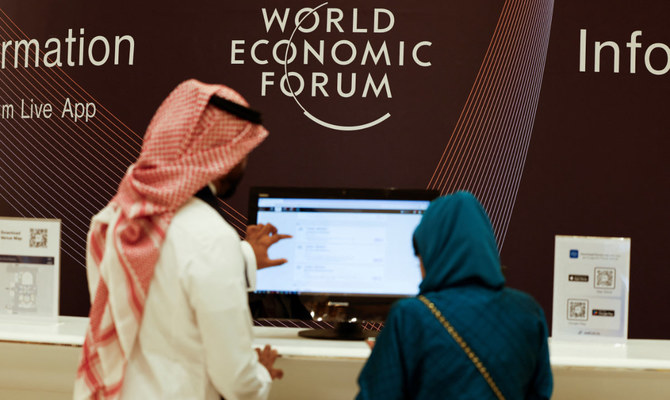
- Nation providing incentives for private sector to become more engaged, Abdulrahman Al-Fadley says
DUBAI: Saudi Arabia has detailed plans for the protection of its lands and environmental resources, the Minister of Environment, Water and Agriculture said on Sunday.
Speaking at the World Economic Forum in Riyadh, Abdulrahman Al-Fadley said: “We have devised our plans based on the preservation of our environment and the management of our water resources. The Kingdom is also providing incentives for the private sector to become more engaged and more responsible toward the environment.”
With 40 percent of lands around the world degraded and further degrading at an alarming rate, critical action is needed as the UN Convention to Combat Desertification COP16 is set to take place in Riyadh in December.
Al-Fadley said Saudi Arabia had preserved millions of hectares of land and set up programs for cloud seeding and increasing the number of dams in the country.
“This will not only be beneficial to the Kingdom but for the whole region,” he said. “With us hosting COP16 we are hoping to give the meeting the importance it commands. We don’t want matters to go back to the status quo after COP16 ends.”
Tariq Al-Olaimy, a member of the Global Shapers Community Foundation Board at the WEF, commended King Salman for his land restoration efforts.
“When you put nature first, you are equally putting people first,” he said. “Nature is our greatest collaborator … There is no successful growth story without successful land restoration and this starts inwardly, through our religion, community, values and moral clarity.”
Ibrahim Thiaw, secretary of the UNCCD, warned of global repercussions if the world did not pay heed to environmental safekeeping.
“Entire ecosystems are being destroyed through actions and inactions,” he said. “There has been a 29 percent increase in droughts in the past few years and that is affecting 1.8 billion people around the world. For poor nations that is disastrous and carries a large death toll of animals, people and agriculture. We have to be more proactive and not just emergency-ready. We must attempt to avoid emergencies.”
Thiaw said the Panama Canal’s functionality had been reduced by 12 percent, which was causing a problem for supplies.
“Demand is increasing while resources are shrinking,” he said. “As humanity we have been looking at resources as if they are unlimited. We have not been managing them. Companies need to reset their relationship with nature and we need to focus on land restoration to keep going.”
Naoki Ishii, director of the Center for Global Commons, had similar concerns.
“We are on a collision course,” he said. “The only solution is to modify our economic system. COP16 must be transformative for all of us. We need the political momentum to implement positive changes.
“If we are able to push those efforts, economically and ideally speaking, that will be a game changer.”
Displacement of Palestinians from embattled Gaza confronts Egypt with array of challenges
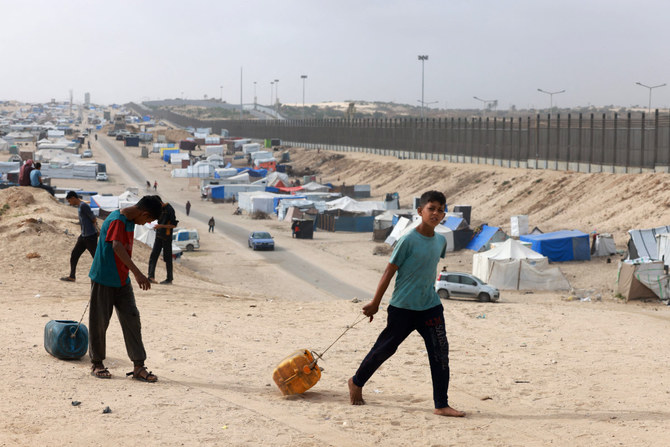
- Egyptians feel morally obliged to help Palestinians but wary of a mass influx through Rafah
- Officials in Cairo see large-scale expulsion by Israel as death knell for Palestinian statehood
CAIRO: More than 1 million Palestinian refugees have found their last refuge in Rafah, Gaza’s southernmost city on the Egyptian border, where they grimly await a widely expected Israeli offensive against Hamas holdouts in the area.
Meanwhile, thousands of Palestinians, many of them with the help of family members already outside Gaza, have managed to cross the border into Egypt, where they remain in a state of limbo, wondering if they will ever return home.
For its part, the Egyptian government faces the prospect of a mass influx of Palestinians from Gaza into Sinai should Israel ignore international appeals to drop its plan to strike Hamas commanders in Rafah.
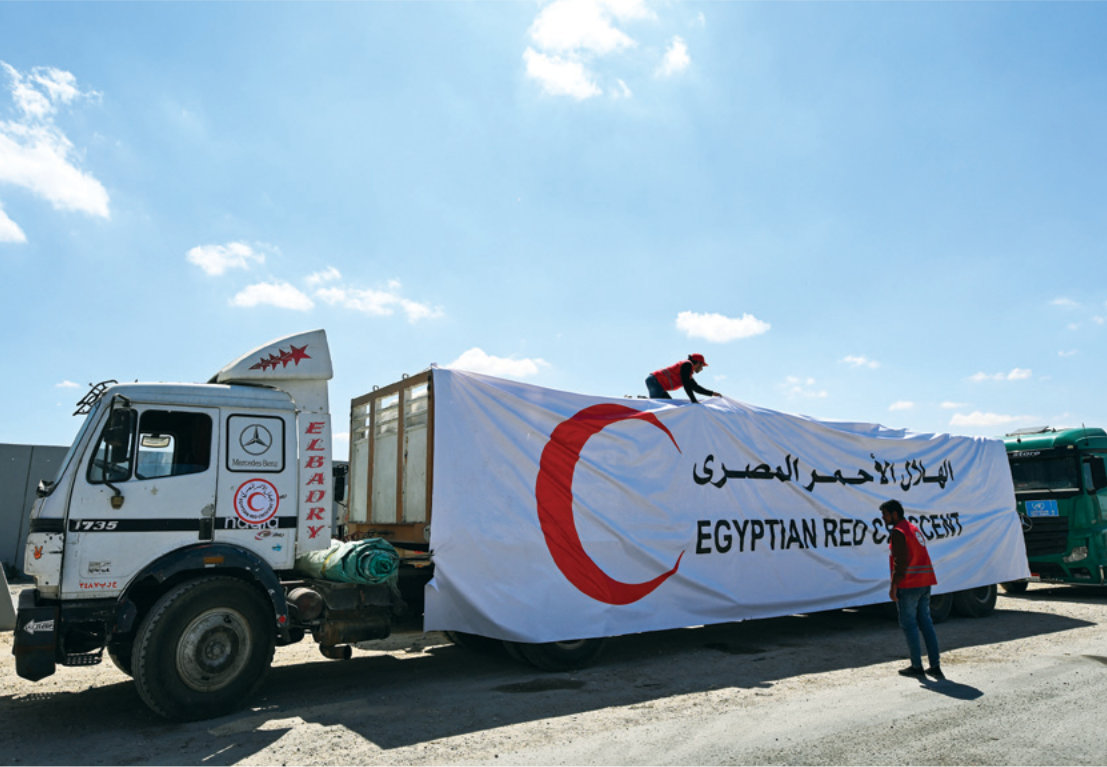
Although the Egyptian public is sympathetic to the Palestinian plight, shouldering the responsibility of hosting refugees from Gaza is fraught with security implications and economic costs, thereby posing a difficult dilemma.
Furthermore, despite taking in refugees from Sudan, Yemen and Syria, the Egyptian government has been cautious about permitting an influx of Palestinians, as officials fear the expulsion of Gazans would destroy any possibility of a future Palestinian state.
“Egypt has reaffirmed and is reiterating its vehement rejection of the forced displacement of the Palestinians and their transfer to Egyptian lands in Sinai,” Abdel Fattah El-Sisi, the Egyptian president, told a peace summit in Cairo last November.
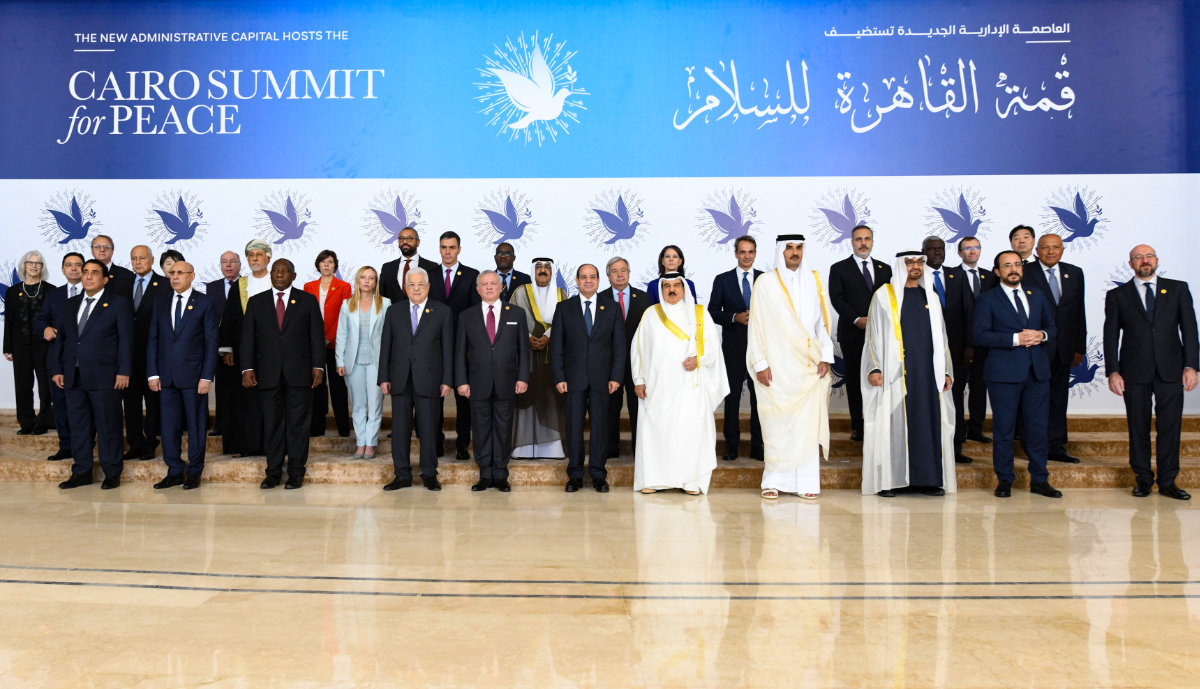
Such a plan would “mark the last gasp in the liquidation of the Palestinian cause, shatter the dream of an independent Palestinian state, and squander the struggle of the Palestinian people and that of the Arab and Islamic peoples over the course of the Palestinian cause that has endured for 75 years,” he added.
Additionally, if Palestinians now living in Rafah are uprooted by an Israeli military offensive, Egypt would be left to carry the burden of a massive humanitarian crisis, at a time when the country is confronting daunting economic challenges.
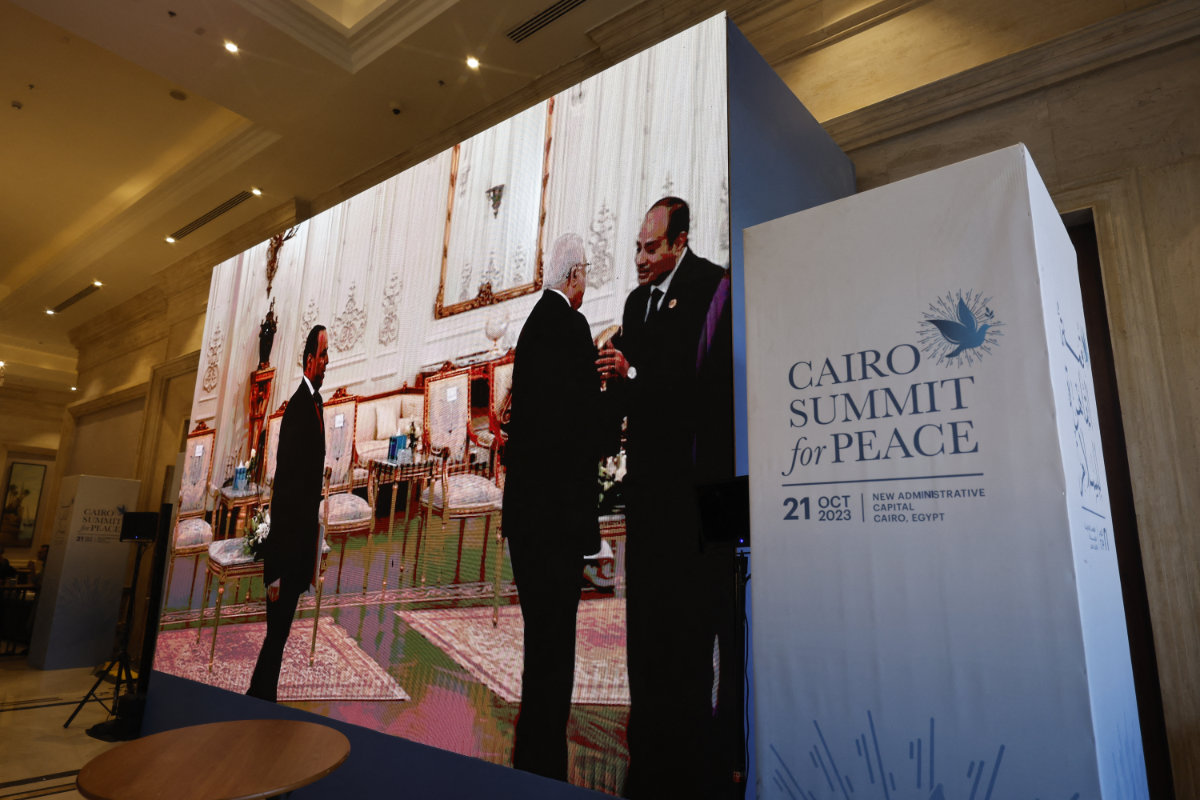
Although Egypt earlier this year landed its largest foreign investment from the UAE, totaling some $35 billion, experts believe that the economic crisis is far from over, with public debt in 2023 totaling more than 90 percent of gross domestic product and the local currency falling 38 percent against the dollar.
Salma Hussein, a senior researcher in economy and public policies in Egypt, believes Egypt is not in the clear yet.
“We are slightly covered but we will need more money flowing in and bigger investments,” she told Arab News. “We also have large sums of debt we need to pay back. The IMF pretty much recycled our debt and we have interest rates to cover.
“In times of political instability, we see a lot of dollars leaving the country in both legal and illegal ways. This happened in 2022 and it also happened during the last presidential elections in 2023.
“I think the same thing will happen again now due to what’s happening in the region. This is all a loss of capital which can affect us.”
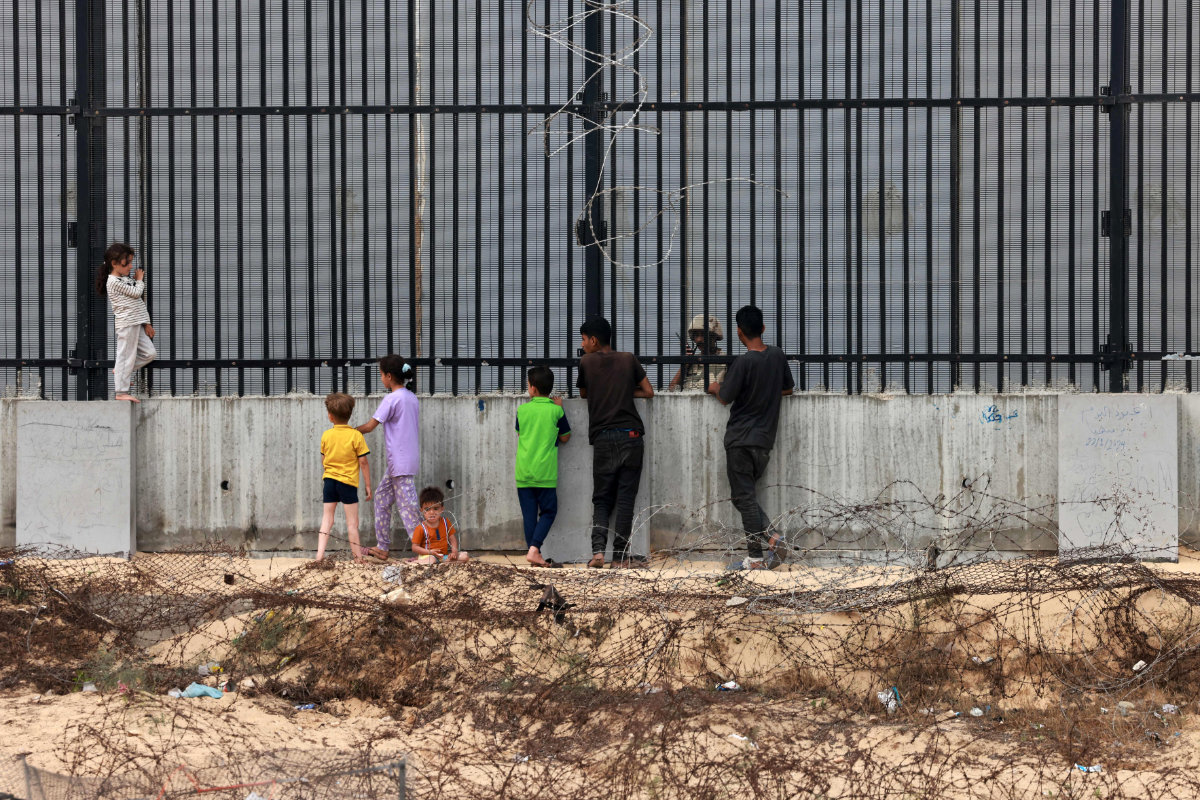
She is confident foreign assistance will be offered. And although the cost of hosting refugees will be high, there are many economic benefits to be had from absorbing another population — even for the Arab world’s most populous country.
“Egypt is too big to fail,” said Hussein. “There will be a bailout of its economy when it’s in deep trouble. And while investments and loans might not turn into prosperity, they will at least keep the country afloat. This is where we are now.
“As for the presence of a growing number of Palestinian refugees, I don’t think any country in the world had its economy damaged by accepting refugees. On the contrary, it might actually benefit from a new workforce, from educated young people, and from wealthy people who are able to relocate their money to their country of residence.”
FASTFACTS
• 1.1 million+ Palestinians who have sought refuge in Rafah from fighting elsewhere in Gaza.
• 14 Children among 18 killed in Israeli strikes on Rafah on April 20.
• 34,000 Total death toll of Palestinians in Israel-Hamas war since Oct. 7, 2023.
However, it is not just the economic consequences of a Palestinians influx that is unnerving Egyptian officials. This wave of refugees would likely include a substantial number of Hamas members, who might go on to fuel local support for the Muslim Brotherhood.
Hamas shares strong ideological links with the Muslim Brotherhood, which briefly controlled Egypt under the presidency of Mohamed Morsi in 2012-13 and has since been outlawed.
Since Morsi was forced from power, the country has been targeted by Islamist groups, which have launched attacks on Egyptian military bases in the Sinai Peninsula. The government is concerned that these Islamist groups could recruit among displaced Palestinians.

The decision might be out of Egypt’s hands, however. Several members of Israeli Prime Minister Benjamin Netanyahu’s right-wing coalition government have publicly called for the displacement and transfer of Palestinians in Gaza into neighboring countries.
Israel’s finance minister, Bezalel Smotrich, previously said that the departure of the Palestinians would make way for “Israelis to make the desert bloom” — meaning the land’s reoccupation by Israeli settlers.
Itamar Ben-Gvir, Israel’s minister of security, also said: “We yelled and we warned, if we don’t want another Oct. 7, we need to return home and control the land.”

Up to 100,000 Palestinians live in Egypt, many of them survivors of the Nakba of 1948 and their descendants. Their numbers steadily rose when Gamal Abdel Nasser came into power in 1954 and permitted Palestinians to live and work in the country.
However, matters changed after the 1973 Arab-Israeli war. Palestinians became foreign nationals, excluded from state services and no longer granted the automatic right to residency.
The precise number of Palestinians who have arrived in Egypt since the Gaza war began after Oct. 7 has not been officially recorded.
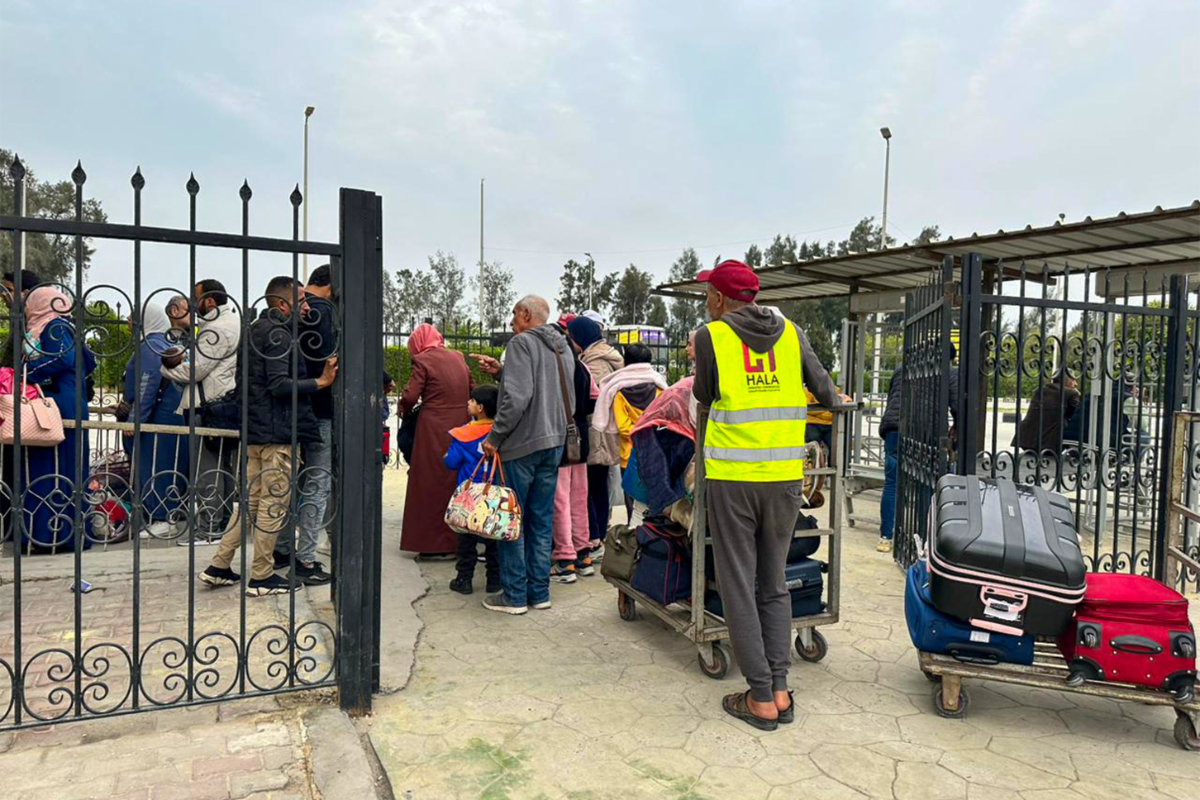
Those who have made it to Egypt, where they are hosted by sympathetic Egyptian families, fear they will be permanently displaced if Israel does not allow them back into Gaza. Many now struggle financially, having lost their homes and livelihoods during the war.
For host families, this act of charity is an additional burden on their own stretched finances. “We feel for the Palestinians but our hands are tied,” one Egyptian host in Cairo, who asked to remain anonymous, told Arab News.
“I am struggling financially myself, but I cannot bring myself to ask for rent from a man who lost his entire family and now lives with his sole surviving daughters.”
On the Egyptian side of the Rafah border crossing, trucks carrying aid and consumer goods are idling in queues stretching for miles, waiting for Israeli forces to permit entry and the distribution of vital cargo.
Many of the Egyptian truckers waiting at the border are paid to do so by the state. “We get salaries from the government and they provide us with basic food and water as we wait here,” one driver told Arab News on condition of anonymity.
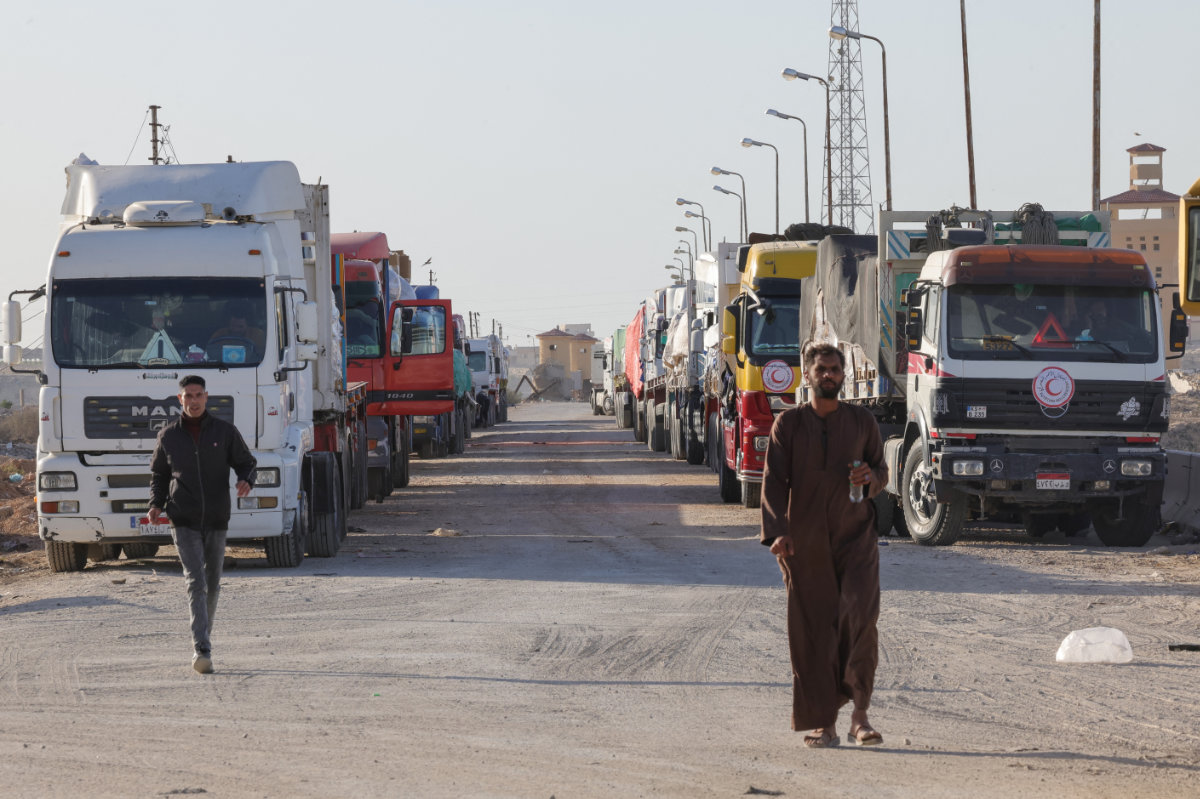
Israel has been limiting the flow of aid into Gaza since the war began, leading to shortages of essentials in the embattled enclave. Although Israel and Washington say the amount of aid permitted to enter has increased, UN agencies claim it is still well below what is needed.
Meanwhile, the truck drivers are forced to wait, many of them sleeping in their cabs or carrying makeshift beds with them. “I’d do this with or without a salary,” the trucker said. “Those are our brothers and sisters who are starving and dying.”
With events in Gaza out of their control, all Egyptians feel they can do is help in whatever small way they can — and hope that the war ends soon without a Palestinian exodus.
“It is unfathomable to me that we are carrying life-saving equipment and food literally just hours away from a people subjected to a genocide, and there are yet no orders to enter Gaza through the border,” the truck driver said.
“It shames me. I park here and I wait, and continue to wait. I will not leave until I unburden this load, which has become a moral duty now more than anything.”







